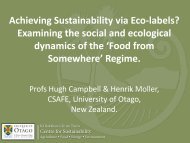Book of Abstract (incl. addendum) - IFSA symposium 2012
Book of Abstract (incl. addendum) - IFSA symposium 2012
Book of Abstract (incl. addendum) - IFSA symposium 2012
Create successful ePaper yourself
Turn your PDF publications into a flip-book with our unique Google optimized e-Paper software.
Workshop 6.1 Balancing and communicating overall assessments <strong>of</strong> food systems<br />
This paper sets to outline the necessary conditions for systemic and creative co-development <strong>of</strong><br />
sustainable food systems from the scratch. The outline starts from the functional unit <strong>of</strong> the system,<br />
identified as the economic relations between the food chain actors, branching <strong>of</strong>f into networks. These<br />
relations are seen to entail additionally the social dimension as well as the environmental one. The<br />
conditions for advancement have been identified as anticipatory network dialogues, allowing sharing <strong>of</strong><br />
knowledge and creating new modes <strong>of</strong> activities, increasing transparency <strong>of</strong> socio-economic relations<br />
and learning about contextual environmental impacts. The communicative challenge pertains to<br />
rendering these features intelligible for actors within the system by <strong>of</strong>fering them modelled virtual<br />
knowledge about the reality for corrective and creative actions. The incremental and stabilized demand,<br />
allowing iterative ‘loop’ developments through economic, social and environmental relations is<br />
hypothesised to end up in over-all sustainability kernel within larger food systems.<br />
Slow Food Presidia: a sustainable agro-food systems?<br />
Cristiana Peano, Paola Migliorini and Francesco Sottile<br />
University <strong>of</strong> Turin, Italy<br />
Cristiana.Peano@unito.it<br />
The aim <strong>of</strong> our study is to develop an indicator-based monitoring tool for sustainability <strong>of</strong> Slow Food<br />
Presidia, taking into account economic, ecological, social and cultural aspects. The SF Presidium<br />
project is not simply promoting a "conservative" development model, where the local capital formed<br />
by the natural and cultural resources are preserved. They are a model <strong>of</strong> re-interpretation, redistribution<br />
and re-appropriation <strong>of</strong> use valuesand resources inherent in the local area starting from the interactions<br />
<strong>of</strong> the latter with thelocal and global context, the specific dialogue between endogenous and external<br />
stimul.<br />
Methodological steps were considered: (i) translating the major SF principles <strong>of</strong> Good, Clean<br />
and Fair into concrete and relevant themes for sustainabilit issues; (ii) designing indicators to monitor<br />
progress towards sustainability for each <strong>of</strong> those themes; and (iii) applying the monitoring tool on some<br />
SF Presidia, as a first attempt at end-use validation. Stakeholder participation and expert consulting<br />
played an important part in each <strong>of</strong> these methodological steps. Results <strong>of</strong> the multi objective<br />
sustainability evaluation <strong>of</strong> some SF presidia are shown .<br />
Reflexivity or assessment? The role <strong>of</strong> self-reflexivity in the assessment<br />
process<br />
Jim Bingen and Bernhard Freyer<br />
Michigan State University, U.S.<br />
Bingen@mnu.edu<br />
If ours is a “postmodern” world, then it is one in which our freedom is constrained by ubiquitous<br />
assessment tools, evaluation reports, controls, and continuous, but <strong>of</strong>ten concealed oversight. With<br />
respect to our food as well, we live in a world <strong>of</strong> seeming countless protections and controls, all<br />
designed to secure high standards in food quality. At the same time, recent disasters (Fukushima) or<br />
recurrent scandals in the organic food chain remind us endemic failures or “normal accidents” and the<br />
questionable moral grounding in our food system.<br />
In this paper we explore the need and possibility for analytic approaches that encourage and<br />
support stakeholder reflection and development <strong>of</strong> the ethical foundations <strong>of</strong> food and farming. This<br />
analytical approach <strong>incl</strong>udes three dimensions: the IFOAM principles, systems theory and<br />
transdisciplinary concepts.<br />
The ethics <strong>of</strong> IFOAM principles <strong>of</strong>fer a framework for self-reflexive processes and guidelines<br />
for a self-reflexive framework within which to develop more individualized ethical approaches to<br />
thinking about food and farming. Systems theory helps identify and sensitize us to the nature, and<br />
106











